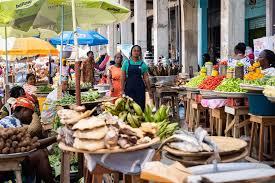Ghana’s consumer inflation dropped for the fifth consecutive month in May, falling to its lowest level in over two years as economic pressures ease across the country.
The Ghana Statistical Service (GSS) announced on Wednesday that inflation declined to 18.4% year-on-year in May 2025, compared to 21.2% recorded in April, reflecting ongoing disinflationary trends and improved macroeconomic stability.
Speaking at a press briefing in Accra, Government Statistician Alhassan Iddrisu said the current inflation trajectory points to a consistent slowdown in price increases. He noted that while food inflation remains a major contributor, the broader drop in non-food inflation indicates a more comprehensive reduction in price pressures.
“The inflation trend we are witnessing shows sustained deceleration. The sharp fall in non-food inflation suggests a broad-based easing across sectors,” Iddrisu stated.
He attributed the development to a mix of fiscal discipline, monetary policy tightening, appreciation of the cedi, and positive global price movements, which have collectively improved investor and consumer confidence.
Also lending weight to the improving inflation outlook is the Producer Price Inflation (PPI), which fell to 18.5% in April from 24.4% in March, showing that costs at the production level are also easing.
Despite these improvements, inflation still remains significantly above the Bank of Ghana’s target band of 8% ±2%, keeping the central bank cautious about relaxing its stance. In May, the Monetary Policy Committee (MPC) held the benchmark interest rate at 28.0%, citing the need to maintain tight controls to keep inflation in check.
Ghana is navigating its way out of the worst economic crisis in decades, triggered by high debt levels, a weakening local currency, and shocks in key export sectors like cocoa and gold.
The crisis forced the country to seek an IMF bailout programme, and authorities have since implemented austerity measures, spending cuts, and revenue mobilization reforms aimed at restoring macroeconomic stability.
Finance Minister Cassiel Ato Forson, in his 2025 budget presentation to Parliament, expressed confidence that inflation will fall to 11.9% by the end of the year, supported by continued fiscal discipline and economic reforms.
Ghana’s currency, the cedi, has also strengthened in recent months, gaining ground against the US dollar and other major currencies — a key factor in reducing import-driven inflation.
Analysts say the positive trend in inflation data could set the stage for interest rate cuts in the second half of the year if the disinflation continues and inflation expectations remain anchored.
However, economists warn that risks remain, including global commodity price volatility, potential fiscal slippage ahead of the 2025 elections, and external shocks that could reverse recent gains.
The easing inflation will bring some relief to households and businesses, many of whom have been grappling with elevated prices, reduced purchasing power, and high borrowing costs over the past two years.
As Ghana continues its recovery path, attention will remain focused on the implementation of structural reforms, fiscal consolidation, and maintaining investor confidence to ensure sustainable growth.
